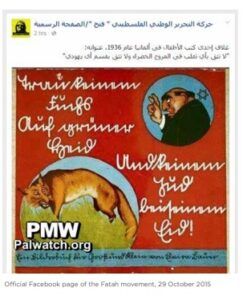Palestinian Authority President Mahmoud Abbas this week reportedly ordered that flags throughout the West Bank be flown at half-mast every November 2, the anniversary of the Balfour Declaration.
President Mahmoud Abbas orders the Palestinian flag to be flown at half-mast on November 2 of each year marking the anniversary of the Balfour Declaration. pic.twitter.com/Sr7XCj2Qod
— Khaled Abu Toameh (@KhaledAbuToameh) October 31, 2021
Abbas’ move is in line with media descriptions of the 1917 commitment by the British government to work towards the establishment of “a national home for the Jewish people” in the Land of Israel as a colossal error. Indeed, the Balfour Declaration has regularly been vilified as the ‘original sin’ that paved the way for the creation of the Jewish state in 1948.
For many prominent news organizations, the legacy of the 67-word letter written by then-British foreign secretary Arthur Balfour to Lord Walter Rothschild is not the rebirth of a nation whose adherents for millennia were, at best, oppressed and, at worst, systematically killed by the millions because they lacked the means to adequately defend themselves.
Rather, the Balfour Declaration is mistakenly depicted as the beginning of the “Nakba [Catatrophe] of Palestinian people and their dispossession and displacement from their land,” in Abbas’ words. This could not be farther from the truth.
Join the fight for Israel’s fair coverage in the news
When Arab leaders embraced compromise with Jews
The fact of the matter is that the Balfour Declaration was supported by many Arabs living in Palestine. Many of them wanted to coexist peacefully in order to benefit from the economic boom being spearheaded by the Jewish population.
Moderate regional leaders also backed London’s diplomatic initiative. In 1919, Emir Faisal, son of the then-Sherif of Mecca, and Dr. Chaim Weizmann, then-president of the Zionist Organization, signed an accord in which the former formally accepted the Balfour Declaration. Under the terms of the agreement, Arabs would encourage Jewish immigration and settlement in Palestine. Freedom of religion and worship was a guiding principle and the deal stipulated that Islamic holy sites would be controlled by Muslims.
In return, the Zionist Organization promised to consider the economic viability of an adjacent Arab state and, if possible, to help develop its resources.
This spirit of cooperation was intended to build on the Balfour Declaration’s vow that “nothing shall be done which may prejudice the civil and religious rights of existing non-Jewish communities in Palestine.”
But The Weizmann-Feisal Agreement was never actualized.
Palestinian extremists create ‘original sin’ myth
It is noteworthy that for all its historical importance, the Balfour Declaration is a relatively vague document, providing no specific guidelines or even a timeline for establishing a “Jewish homeland.” In other words, there was nothing in the document or stated British commitment that would have prevented any type of negotiated settlement from being reached.
As such, the Balfour Declaration in and of itself did not set the stage for what is now known as the Israeli-Palestinian conflict. Instead, it was largely the byproduct of rejectionism by extremist Arab leader Haj Amin al-Husseini, who in 1921 was appointed Mufti of Jerusalem by the British.
This, though many of his subjects, even those with a modicum of authority, did not reject the Zionist movement.
In the end, al-Husseini ultimately prevailed.
Related Reading: Did Balfour Declaration Give Jews a License To Steal?
Grand Mufti of Jerusalem unleashes violence against Jews, allies himself with Adolf Hitler
During his 15-year tenure as Mufti of Jerusalem al-Husseini instigated Muslim riots against Jews that resulted in hundreds of deaths. Most notably, he incited the 1929 pogroms that included the Hebron massacre. He was tried and convicted by British Mandatory authorities for inciting decades of violence against the local Jewish population.
Even so, when the British announced that they would be withdrawing from the territory, the United Nations presented the 1947 “Partition Plan,” which envisioned the creation of both a Jewish and Arab state, the latter including all of the strategically imperative high ground, one-third of the coastline and control over the main aquifers. The Jewish state was to be comprised primarily of the barren Negev desert.
The Zionist leadership accepted the proposal. The Arabs, however, rejected it, stating bluntly that they would attack if the Jews attempted to establish a state – with the goal of destroying it.
Related Reading: Hitler’s Palestinian Ally: Grand Mufti Amin Al-Husseini
The Grand Mufti – praised by Palestinian Authority President Mahmoud Abbas as a “hero” and a “pioneer” – gained most of his notoriety as a Nazi collaborator. During World War II, the cleric served as an Arab ally and propagandist for the Third Reich, which manifested in ongoing campaigns of antisemitic warfare in Palestine.
Shortly after Adolph Hitler seized power, Amin al-Husseini met with the German consul in Jerusalem, during which he spoke approvingly of the Nazi’s anti-Jewish policies and conveyed his concerns about the increase of Jewish immigration from Germany to Palestine. In 1941, al-Hussein explained to Hitler that the Arabs were Germany’s “natural friends” because they had the same enemies: namely, “the English, the Jews, and the Communists.”
The official record of the meeting notes that Hitler assured the Mufti that he would carry on “the battle to the total destruction of the Judeo-Communist empire in Europe.”
Some eight decades later, Abbas’ ruling Fatah faction posted to its official Facebook page the cover of a Nazi children’s book from 1936:

The text translates into: “…trust no Jew.”
Palestinian rejectionism vs. Israeli push for peace
The Arab leadership may well have been able to achieve statehood had it dropped its maximalist positions and negotiated with the Jewish leadership. However, it chose the path of “resistance.” Successive Israeli governments nevertheless attempted to forge a path towards a peaceful resolution of the Palestinian issue.
Notably, immediately after Arab nations in 1967 launched an annihilationist war against Israel, Jerusalem offered to return the territories it captured in return for peace. The Arab response to Israel’s land for peace offer became known as the Three Nos:
- No peace with Israel
- No recognition of Israel
- No negotiations with Israel
Once again, the Palestinians could have achieved statehood if not for the refusal by radicalized Arab nations to countenance the existence of a Jewish state on any territory.
In 1993, the Oslo Accords between Israel and the Palestine Liberation Organization led to the creation of the Palestinian Authority. The agreement was based on a promise by the Palestinian leadership to renounce terrorism and resolve all outstanding issues with Israel through bilateral negotiations.
To date, the Palestinian leadership has failed to meet its obligations.
Related Reading: How Previous Israeli-Palestinian Peace Plans Failed
In fact, neither the Israeli government’s repeated good-faith efforts to jump-start the peace process nor Ramallah’s incessant intransigence — not to mention that Hamas rules the Gaza Strip — is accurately reported by media.
Such as:
- 1997: Israel attempts to revive the Oslo Accords by withdrawing from Hebron
- 1998: Israel promises to relinquish land, as the PA fails to fight terror
- 2009: Israel freezes all West Bank construction
- 2011: Them-prime minister Benjamin Netanyahu delivers a speech to a joint session of Congress, declaring that Israel is willing to make more “painful compromises” for peace
- 2014: Abbas announces his intention to form a unity government with Hamas.
- 2019: PA boycotts Trump administration’s peace to prosperity workshop
Yet, Israel continues to seek out peace with its Arab neighbors. While the Palestinian Authority continues to rebuff peace overtures and incite violence, the Jewish state has signed peace deals with Egypt and Jordan, and, most recently, normalized relations with four Arab nations under the auspices of the Abraham Accords.
Media, How is coexistence ‘divisive’?
Now, history appears to be repeating, as there is once again a disparity between the policies of the Palestinian leadership and the desires of ordinary Palestinians. A recent poll by the Ramallah-based Palestinian Center for Policy and Survey Research found that achieving better living standards is of the utmost importance for Palestinians, whereas only nine percent of those surveyed said that “strengthening the resistance to occupation” was their foremost interest.
Still, Mahmoud Abbas continues to engage in anti-Israel political theater, including suing Britain over the Balfour Declaration.
This will likely continue to be the state of affairs until those living under the PA’s and Hamas’ rule choose to adopt the core message of the Balfour Declaration: that is, recognition of the Jewish people’s right to determine their own fate in their own land.
Until the powers that be in Ramallah and Gaza City accept this, all inhabitants of the Land of Israel will continue to be denied the most precious of all commodities: PEACE.
Featured image: Public domain via Wikimedia Commons with additions by HonestReporting
Liked this article? Follow HonestReporting on Twitter, Facebook, Instagram and TikTok to see even more posts and videos debunking news bias and smears, as well as other content explaining what’s really going on in Israel and the region. Get updates direct to your phone. Join our WhatsApp and Telegram channels!


